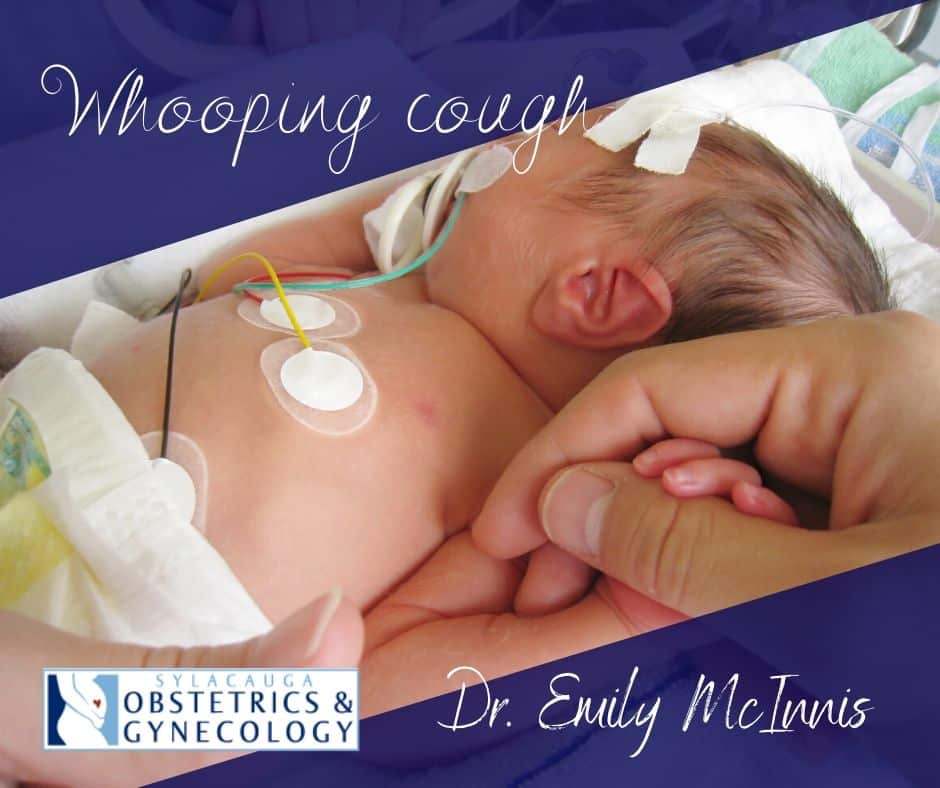
29 Jun Protect yourself and your baby against whooping cough with Tdap
When your baby comes down with whooping cough, it is not an easy thing to watch. With a narrowed windpipe, they struggle to breathe, they choke, and then finally the “whoop” happens – a small amount of air finally gets through.
Whooping cough (also known as pertussis) can be very serious for infants and small children. Moreover, pregnant women in their third trimester are also at an increased risk. Babies under six months are particularly at risk of acute complications and are often admitted to the hospital for treatment and symptom monitoring.
The Centers for Disease Control reports that babies less than a year old have a 50% chance of being hospitalized after contracting whooping cough. A sobering statistic for an otherwise healthy baby!
Isn’t whooping cough a disease of the past, like smallpox?
We usually think of whooping cough as one of those diseases that was essentially eradicated in the 1940s, when the US started giving more widespread vaccines. But over the past four years, the incidence of whooping cough has been on the rise. Why this increase? Dr. Emily McInnis with Sylacauga OB-GYN tells us, “As many as 65% of expecting moms in the past year have not gotten their Tdap vaccination. This is unfortunate for many reasons. One reason is that newborns do not have immunity to these diseases until they receive their first set of vaccinations. This short period of two months can expose babies to deadly diseases that could very easily be prevented.”
How do I lower the risk of my baby getting whooping cough?
The answer here is plain and simple: get vaccinated. We now advise our pregnant patients in their third trimester to be vaccinated with a booster that treats a number of serious illnesses. The medical community refers to it as the Tdap booster vaccination.
Tdap, used to treat tetanus, diphtheria, and pertussis (whooping cough), permits the mother to pass part of her more established immune system to her baby, which can prevent the baby from contracting one of these diseases.
Dr. McInnis continues, “According to the CDC, Tdap during the third trimester of pregnancy protected 9 in 10 babies from serious infections needing hospital treatment. For the few babies that do happen to get Pertussis after the vaccine, there are significantly fewer ICU and hospital stays with the vaccine compared to without. I feel strongly that we are very lucky to have accessibility to these vaccinations. It is important to know, however, that the immunity from this vaccination does not last forever. Babies will need to continue their scheduled vaccinations with their pediatrician, and mothers will need to receive a Tdap vaccine for each pregnancy.”
Is it safe for pregnant mothers to get vaccinated with Tdap? And is there a risk of harm to the fetus?
Per Dr. McInnis, the Tdap vaccine is absolutely 100% safe for you and your baby. She tells us, “There have been numerous studies showing that there are no fetal effects from vaccination in the 3rd trimester. The whooping cough vaccine cannot give you whooping cough since it does not contain live bacteria. The vaccines we use contain purified, inactivated parts of the bacterium that causes whooping cough, Bordatella pertussis. You can get this vaccine at the same time as others, including the flu vaccination which is also highly recommended in pregnancy.
Dr. McInnis continues, “Further, getting the Tdap vaccine is also recommended if you are planning to breastfeed, or are currently breastfeeding. Of note, Tdap does not contain Thimerosal, which is a mercury-based preservative found in some types of vaccinations.”
How do I know if my baby has whooping cough? What should I watch for?
Are you worried you or your baby might be coming down with the highly contagious whooping cough? Here are a few tell-tale signs you’ll want to watch out for:
- The first symptoms unfortunately mimic the common cold. This means a runny nose, mild cough, low-grade fever.
- After 1 to 2 weeks, these symptoms turn into more traditional symptoms of whooping cough, including:
- Rapid, frequent coughing “fits” that result in a “whoop” sound when the baby catches their breath.
- Extreme lethargy after such an attack.
- Babies may even vomit after the coughing fit.
Ironically, babies can seem perfectly fine in between these horrible coughing fits even though they will still have whooping cough. It won’t just go away by itself, so parents should intervene early by reaching out to their physician.
Antibiotics are the normal course for treating whooping cough. Children and babies need to stay hydrated while on antibiotics, and because the disease is highly contagious, they need to stay away from others as much as possible.
Whooping cough can be scary; take preventative measures
The scenarios around your baby getting whooping cough can sound really scary. The good news: getting a Tdap vaccination early in your third trimester is the solution to this problem.
One final caution from Dr. McInnis. Before your baby is born, you should talk to others about making sure they are up-to-date with the Tdap vaccine. This includes the baby’s father, grandparents, siblings, aunts, uncles, cousins, babysitters, and daycare staff. If someone is not up-to-date, he or she should get the whooping cough vaccine at least two weeks before coming in close contact with the new baby.
By being vaccinated, you’re helping protect your baby, yourself, and all your loved ones all at the same time.


